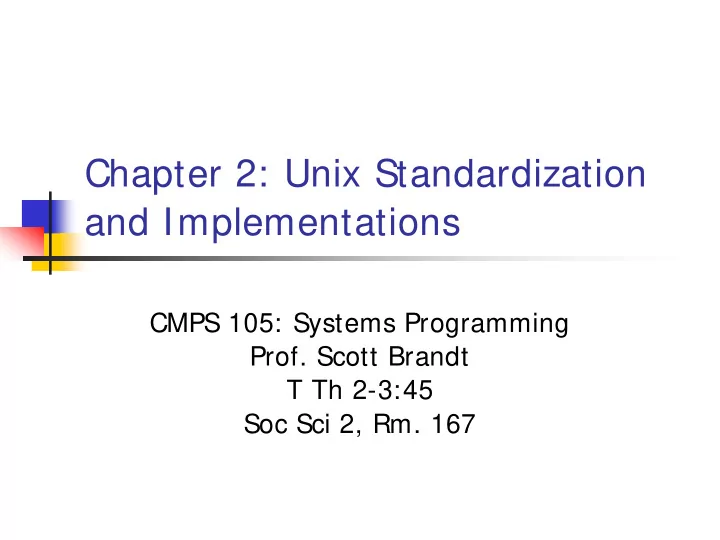

Chapter 2: Unix Standardization and Implementations CMPS 105: Systems Programming Prof. Scott Brandt T Th 2-3:45 Soc Sci 2, Rm. 167
In The Old Days… � Before Unix, every hardware vendor had their own operating system � These systems were completely proprietary � They were not open � You had to buy tools from the hardware vendor � Code was not portable from one platform to another
Multics � A joint OS venture between MIT, AT&T Bell Labs, and GE to develop a new OS � Every good OS idea, up to a point, appeared in Multics � Virtual memory � File system � Security � Etc. � As a result, Multics was huge and cumbersome � It eventually failed, although everyone liked the idea
Unix is Born � Several researchers at AT&T Bell Labs still liked the idea of a new OS � In 1969, they began by designing a new file system � Keep in mind that these were relatively new � Then they added an assembler, a shell, process management, and some basic I/O � Unix was born
Goals of Unix � Unix was intended to be: small, flexible, portable, efficient, a programmer’s tool � It was really written by a group of hardcore programmers for themselves and people like them � C was developed to facilitate UNIX development � Another innovation: pipes and lots of small utilities � Side note: the shortened names for everything were an accident
Different Versions of Unix � AT&T licensed the Unix source code to Berkeley � Researchers at Berkeley started working with it and made lots of changes: BSD Unix � But others couldn’t use it without an AT&T license � Eventually, Berkeley people rewrote the AT&T proprietary parts so that they could distribute theirs � Later: SunOS/Solaris, DEC Ultrix, HPUX, Xenix � Even later: Linux was born � First really, truly open-source Unix
Brief History of Windows � In the early 80s, IBM decided to produce a “personal computer” � 1 MHz processor, 5 MB HD, 128K RAM? � They contacted a small software company led by Bill Gates to ask them if they would produce a version of their DOS system for the new “PC” � First version of DOS wasn’t much of an OS � DOS stands for “Disk Operating System” � Windows idea was stolen from Xerox PARC
Why Standards � Problem: as soon as everyone gets their hands on something (C, UNIX, etc.) they start changing it to suit their needs � Issues: Portability, modularity, reusability, interoperability, etc. � Standards efforts driven by the government, and by corporations � ANSI C, IEEE POSIX
Different Interfaces � Many different flavors of UNIX support different system call interfaces � POSIX specifies one set of interfaces and semantics � Many extensions exist
Limits � Portability requires that data types be the same on different architectures � Even if the hardware is different � This requires careful standardization of the data types � How they are stored and interpreted, how many bits, formats, endian-ness, max, min, sign, …
Some Limits � Size of char, short, int, long � Signed/unsigned � Min/max values � Pathnames � Open files
Primitive System Data Types caddr_t clock_t comp_t dev_t fd_set fpos_t gid_t ino_t mode_t nlink_t off_t pid_t ptrdiff_t rlim_t sig_atomic_t sigset_t size_t ssize_t time_t uid_t wchar_t
Recommend
More recommend